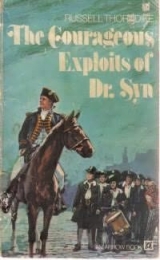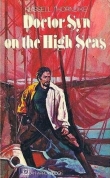
Текст книги "The COURAGEOUS EXPLOITS OF DOCTOR SYN "
Автор книги: Russell Thorndike
Жанр:
Исторические приключения
сообщить о нарушении
Текущая страница: 14 (всего у книги 16 страниц)
“Let us keep to the point,” ordered the Captain. “I presume that you have been preparing other casks in a similar
way, eh? One barrel of bones would not fertilize the Marshlands. Many barrels of bones would, and many barrels
could bring much tobacco in their innards,. Now, exactly how many of these casks did the Sexton order?”
“My mate and I have orders to prepare fifty in that way,” confessed the cooper.
“Fifty? You should have told me this at once,” cried the Captain eagerly. “Now we are progressing. When must
you complete this order for fifty barrels?”
“They are to be ready for a ship at Hythe to take them aboard by next Friday morning, sir. I don’t think they will
give me any more time off till then. Indeed I have to make up for this visit by working out the hours missed this
evening.”
“You mean you will not be able to visit me here again,” said the Captain. “That will be as well, in any case. One
of my men can meet you in Hythe for any further information. Far be it from me to hinder your work. The quicker
the casks are shipped the quicker they will be back again. Can you give me any further information now? I want to
know, for instance, the name of that ship that is to take the casks aboard at Hythe.”
“To be exact, sir, there are two of them,” went on the cooper. “Both smacks. One a Hythe boat named the
Plough, and the other, so I heard, the Strawberry from Deal. They are to be shipped empty to some port in France.”
“The Plough and the Strawberry, eh?” repeated the delighted Captain. “Do you know, my lad, I think you will
be winning your security ashore all right. You seem to have done the Government good service already. Believe
me, I have no wish for it to be otherwise. And the casks are to go out empty, eh? Well, I shall take no steps to
prevent their shipment, I assure you. But I shall be awaiting their return most anxiously, I assure you. What a
situation when I order them to be split open, and we take a look at those cavities! Now listen to me. You will hold
no communication with your good friend, the Sexton, until such time as the Plough and the Strawberry return with
their cargo of bones. Neither will you say a word of this matter to the Vicar here. It is a good thing that your work
will keep you from Dymchurch. You must keep your ears and eyes wide open, Master Cooper, and your mouth as
tight as a sealed keg.”
“Yes, sir,” assented the cooper. “I should not wish to come over to Dymchurch in any case.”
“Not even to see the Dymchurch lass you are hoping to marry?” asked the Captain roguishly.
“She is also working at Hythe, sir,” explained the cooper. “At the ‘Red Lion’, sir. She is in the kitchen there.”
“Very convenient, too,” replied the Captain, “and for your sake I am glad to hear it. Tell me, when will you be
going to see her, on Thursday, which is the day before the casks are taken aboard?”
“I shall call there at six in the evening, sir. If she is busy and cannot get out, which is often the case, the landlady
there lets me spend half an hour with her in the kitchen.”
“Then go into the bar at a quarter to six,” ordered the Captain, “and my Bos’n will be there. Anything further
you may have learned, which you think I should know, tell him. Also he can give you any further orders that I may
consider necessary.”
This conversation was interrupted by the return of Doctor Syn from church. If he was surprised at finding them
still there, he did not show it. But as both the Captain and the cooper stood up at his entrance, he apologized for his
disturbance. “Forgive me, Captain,” he said, “I have not come to turn you out of my study, which you are both
heartily welcome to, but I know you will not mind my changing my gown for my jacket, before leaving you again.”
“Indeed no, Parson,” answered the Captain. “My business with this good fellow has been finished some time,
concerning that cask of ours that had sprung a leak. But our friend here has been interesting me. He has let me into
some of the mysteries of his craft. I thought I knew something of it, but when confronted by a master cooper, young
though he is. Well, Master Lee, I must not detain you further. But I am your debtor for all that you have explained
to me, and shall be able to be a lot more critical with my coopers when I get back to my ship.”
“Poor fellows,” laughed the Doctor.
“I suppose now, Parson,” went on the Captain, “that you have never had the love for barrels and kegs, eh? Your
profession hardly warrants it. But to one who loves ships as I do, well, a good cask is a fair thing.”
“I agree with you, Captain,” laughed the Doctor again, as he pulled his gown over his head and hung it up in the
alcove, adding, as he took his jacket from the peg behind the door: “I love anything that is well fashioned. I can
even admire a well-made coffin in my Sexton’s shop. He’s a good carpenter, is Mipps, but he cannot make a barrel
like young George here. He told me only the other day that coopering is outside the scope of the carpenter, though I
think it is the only thing made of wood that he could not make a good job of.”
“Aye, Vicar,” put in the cooper, “there’s little else that Mipps cannot make, and I sometimes think that he could
turn out a good cask too, if he had a mind to it.”
“Well, a ship’s carpenter no doubt has to lend a hand with the barrels should they go wrong, doesn’t he,
Captain?” asked the Vicar innocently.
“Aye, and they sometimes combine the two professions, though I have always carried a sea-cooper as well as a
ship’s carpenter and sail-maker. They pick up a good deal from one another, and can lend a hand, as you say. But I
have no doubt that you wish to dismiss the subject of barrels in order to think of sermons, eh?”
“I fear I have to devote the rest of the morning to parochial accounts, Captain,” said the Doctor, making a wry
face. “A parson is exp ected to have a smattering of all professions. But I never could learn a love for figures
myself. At Oxford I took classical languages and, my faith I begin to think that mathematics would have been more
useful. Well not, I see that your glasses are emp ty, and that you left the bottle in the hall. Now that service is over I
can take another glass myself, for a glass of good wine hurts nobody, I think.”
Doctor Syn went out and brought back the bottle and his own glass, when once more the health of George Lee
was drunk.
This time it was the Captain who proposed it with” “A word of advice, my young cooper. If you want to marry
soon, and settle down to your craft, avoid walking out late in such a town as Hythe, for though I say it against a
section of my own calling, the Press Gang have had orders to be active, and they are a rough lot of rascals, without a
shred of sentiment. They possess no conscience at all, when they have to make up a complement of likely fellows.”
“I have always felt the same, sir,” replied the Vicar. “Take the Captain’s advice, George, and if they should lay
hands on you have no scruples at claiming protection from my guest here. I warrant he could free you quicker than
most.”
“And that’s true enough,” agreed the Captain. “But unfortunately I might never get the word sent to me, so I still
warn the youngster not to give the Press gang an opportunity. We know this about their ways, and that is that they
know their own unpopularity. Consequently they work mostly at night when nobody is about, and a chance of
rescue less likely.”
“I will remember your warning, sir, thank you for it,” replied the cooper, who then finished his wine and went
towards the door. He knew full well that the Captain’s warning was a threat which Doctor Syn could not appreciate.
To prevent any words passing between his victim and the Vicar, the Captain took up his hat and followed the
cooper, but no sooner had they passed the Vicarage gate than Doctor Syn had begun to be made master of the whole
situation by Mipps, and he then fully appreciated as much as the cooper did, that the Captain’s warning was a threat
indeed, and not only levelled at the cooper, but at his whole organization across the Channel and upon the Marsh.
13
CONCERNING A CARGO OF BONES
Mipps was glad enough to be released after so long a spell of being cooped up behind the Vicar’s garments, and he
took the excuse to point out that though his limbs were not so stiff, his throat was uncommonly dry with stifling a
continuous desire to cough, which would have ruined all.
This was soon remedied by accepting the Vicar’s offer to take a good pull at a half-finished bottle of brandy
which the Vicar produced from behind a row of large tomes in the bookshelf.
The Sexton was then in trim to recount all that he had overheard.
“Well, it is a pity that the tobacco will not be able to be packed, s we had planned it for this voyage,” whispered
Doctor Syn. “Although the Scarecrow naturally depends upon the big landing, guarded by the Nightriders, these
little runs upon this side keep our wits sharp and certainly increase the annual turnover of profit for the men. But I
warrant I’ll find a way to get the Plough and the Strawberry safely into port with the same weight of tobacco, for I
have had another scheme in my head for that tobacco business, and when our ally across the Channel is informed of
it, he will delight in carrying out my instructions. Although the casks must carry bones and nothing else upon this
voyage, it will free them from any further suspicion. The Customs people always fear being made fools of twice in
the same manner. Certainly the Captain will be blamed for the foolery this time, and they’ll all feel shy of any
future cargo of bones.”
“We must be careful, however, not to implicate young Lee, for when no tobacco is found the Captain will be very
angry, and suspect young George of having passed the word of warning to the Scarecrow’s men. We must, of
course, avoid Hythe till the empty casks have been shipped, and I don’s think George will be so stupid as to come
over Dymchurch way.”
“He’ll be far t oo busy fitting the casks for that, sir,” said Mipps. “It’s a pity we didn’t have them casks made
over in France, then none of this would have happened.”
“Nonsense,” laughed the Vicar. “They have to last for many a voyage, and the shop in Hythe turns out better
work than they can manage over there. Besides, it is a lesson to us not to be too greedy. I was in two minds about
the tobacco being packed with the first consignment of bones. And now fate has warned us to be cautious. I am
right about the revenue men being reluctant at repeating an experiment that has failed them. They will not damage
our casks a second time, believe me. The innocent bones will teach them a lesson.”
Mipps chuckled. “They ain’t forgot the lesson they learnt over the Providence of Folkestone.”
Doctor Syn nodded. “Aye, that was a case in point. When we fitted her with a false bow we put no contraband
inside it on the first trip. You remember that I feared information had leaked out, and we took no chances. In those
days we employed one or two fellows who had not learnt to keep their mouths shut in the waterside taverns, and so
our beautiful false bow was broken open upon her first arrival. But having to pay for wanton damage to the
structure made them shy of unripping her again. And so it will be this time. The very sight of bones in casks will
make the rascals sheer off, you’ll see. They’ll avoid bones as they avoided searching for kegs aboard the Flower of
Rye. You recollect how we covered them with sprats, and delayed getting to port till they stank the harbour out?”
Mipps laughed. “Aye, that was a good trick of yours, Vicar. We’ve run some queer cargoes in the past.”
“And have not lost our ingenuity, I hope,” replied the Vicar. “So here’s to us, and to the Captain’s
disappointment over the bones.” Doctor Syn paused, and then added, “When does your onion-boy come here
again?”
“Expected him today,” replied Mipps, “but the Channel’s choppy, and it may be tomorrow. Whatever the
weather, he’ll be here then.”
“I’ll have his parchment ready by tonight, then, said Syn. “I’ll instruct Duloge to pack that tobacco in different
fashion, this trip.”
“Have you thought it out how, sir?” asked the Sexton.
Syn filled his churchwarden pipe and lighted it leisurely. He then sat down in his high-backed chair, and
appeared to be merely enjoying the flavour of the smoke. Mipps, knowing this to be a sign that his master was
thinking, kept silence. At last the Sexton saw his expression change to a frown, which lasted some thirty seconds,
and then give place to a pleasant smile.
“He’s thought of something,” said the Sexton to himself.
The Doctor went on smiling and smoking, now and again giving vent to an audible chuckle.
“Aye, Master Carpenter,” he said at last. “I have thought out ‘how’. That tobacco shall come over on the decks
of the Plough and Strawberry. What is more, should the Captain remain after he has examined the casks, he will see
the tobacco slung ashore without any suspicion. He could even handle the stuff and not recognize it as contraband.”
“And might one ask just how, sir?” asked the Sexton.
“You may,” agreed the Vicar. “Duloge has not got a very satisfactory coopers’ shop over yonder, but we cannot
criticize his rope factory. That he can turn out good rope, you’ll admit. Very well, then. The tobacco can be
twisted tightly into rope lying aboard coming under suspicion. It can be slung on to the quayside and removed
under their very noses.”
Mipps nodded, and then of a sudden looked doubtful as he remarked: “When connected with ‘Free Trade’ a rope
ain’t a pleasant thing to contemplate. It would be a bad thing to hang even with tobacco twist round one’s throat.
Let’s hope the Froggies thre ads it well.”
“Duloge is proud of his rope, and justly so,” replied Syn. “I don’t anticipate that he will make it carelessly when
there is good twist inside.”
Mipps nodded once more. “Aye, he’s clever enough for a Frenchman, and would be a man after my won heart if
he could only speak the King’s English. But he’s got good English courage, as well as the cunning of a foreigner. I
will say that for him.”
“Courage and cunning are the two qualities that you and I must cultivate to the full,” said Syn. “We must be very
bold and very sly until such time as we can rid ourselves of this Captain Blain, for both these qualities he has very
highly developed.”
The eyes of the little Sexton twinkled, and his face became wreathed in smiles as he exclaimed: “Now you are
talking sensible, Vicar. Rid ourselves of Captain Blain, eh? I’ve been waiting to hear them blessed words of
comfort. And the sooner the better, I says. He seems to have got on to me with his nasty suspicions, and once on to
me who knows as how it won’t be you next, sir? And apart from us there’s that poor young George. We wouldn’t
have him sent to sea by the Press Gang, I knows.”
“We will not, Mipps,” replied Syn. “We must watch the Captain closer than ever. He suspects you, and that
means he’ll watch you closer than ever. And what you say about me is right, too. I have become aware lately that
he is trying hard to pump up from me the truth about my past. He is a great lover of the sea. He knows its history.
Only the other night he kept me up late telling me stories about Captain Clegg in the Caribbees. Tales of my old
self, Mipps, and very creditably told too. They were painfully correct, and as I listened I lived some exciting times
over again, I assure you. Here and there I longed to add details of which he had not heard. As it was I feigned a
disbelief in such wild adventures. I had a longing to take him by the throat and to tell him that Clegg was never
hanged at Rye, but had lived to choke the life out of an inquisitive sea captain. I found that feeling growing on me
when he began to sing my old chanty, ‘Here’s to the feet what have walked the plank. Yo -ho for the dead man’s
throttle’. Little did he guess how near death he was at that moment. One pounce and the dead man’s throttle would
have been at his throat. Do you know what saved him, Mipps?”
“What did?” asked Mipps. “Whatever it was, was a pity.”
“Aye, and a pity it was,” nodded the vicar, with a smile. “He sang it so badly, Mipps, and all the while I thought
of our roaring devils sending the same tune down the wind and waves, and my rage against him was blown away,
because I felt he was not worth the killing.”
“Well, I’m glad you thinks better of it now, sir,” said Mipps. “I know that nothing would delight the Nightriders
more than to get the word to take him off your hands. They resents him staying on at the vicarage, drinking you
good liquor, though I has had it pointed out that it is the only way for me to keep an eye on him on behalf of the
Scarecrow. There are lots of ways we can do it. We can come at night and take him from his bed, and then he can
either be found a-hanging on the gallows, or not be found beneath the slime of the sluicegates.”
“My good Mipps,” said the Vicar in reproving tone, “I happen to be very sane at the moment. My rage which
was blown away, has not returned, and I shall not forget that the man is at least my guest.”
“But you spoke just now of getting rid of him, sir,” pleaded Mipps, at the same time producing his great claspknife and looking at it sorrowfully as it lay on the palm of his dirty hand. “There are some people whom I wouldn’t
pity at killing. Your guest happens to be one. If ever a man was ripe for the plucking, I thinks he is. And you’ve
only to give me the hint, and he’s as good as.”
The Doctor shook his head. “He is at least a dangerous enemy, and I have ever had a regard for such a one. We
have had many to deal with in our time,. I think you’ll agree with me there, Master Carpenter?”
Mipps grinned. “Aye, that we has, Cap’n. The other night, or rather the other early morning, ‘cos it was after
we’d got back from a secret meeting at the Oast house, I was a-swinging in my hammock, thinking as how a drop of
sleep was overdue and badly needed, I starts in to count the individuals what we have had to remove from this
terrestrial globe, because of their iniquities towards us, as the Bible says, and believe me, sir, I got into very high
figures before I did get a wink of sleep, and there was a lot more victims waiting to be called for to show a leg.”
“But none of them went unjustly, Mipps,” said Syn sadly. “At least I like to think so.”
“They all of ‘em deserved a good deal more than what they got,” declared Mipps with conviction. “And I’d so
‘em all over again, only I’d do ‘em a bit slower if possible.”
“I sometimes suspect you of being a bloodthirsty little rascal, my good Mipps,” said the Vicar reprovingly.
Mipps answered stoutly, “If I thought that my pet spider, Horace, was annoying you, sir, I’d tread on him, and
not feel sorry neither.”
Syn laughed. “I must confess that I do not share your affection for Horace, but every man to his tastes. Since
you like spiders and I don’t, no doubt I am the loser. Does he keep well, by the way? I have neglected to inquire
after him lately, I think.”
“As fat as ever, and could do with a shave on all eight legs,” said Mipps with enthusiasm.
“I fear he would not last long were I to be accommodated in your hammock,” laughed the Doctor. “I could sleep
sounder in the condemned cell at Newgate than in proximity with that brute.”
“Oh, I likes to see Horace run out and squint at me from the beam above me,” went on Mipps.
“Never any tremors that he might fall upon you?” asked the Vicar.
“He wouldn’t hurt hisself if he was to fall from the rigging,” replied Mipps seriously. “But talking of Newgate, if
my hands ain’t as black as Newgate knocker. Must have been sitting down there in the corner.”
“Mrs. Fowey would not take that as a compliment,” laughed the Vicar. “But run along and wash ‘em at the
pump, and if she catches you at it tell her that it was dirt from the bell-rope when you pulled it for service. We must
not fall out with our housekeeper.”
Mipps chuckled and withdrew. Doctor Syn took from a drawer a sheaf of foolscap. On the top page of it were
noted ideas for his next Sunday’s sermon. But the Vicar did not look at them. He produced a tiny piece of
parchment from another drawer, and laid it upon the sermon paper. He then selected the finest pointed quill from a
silver tray, and began to write in minute letters instructions in French for his agent, Monsieur Duloge, who managed
the Scarecrow’s organization across the Channel. Before he had finished this, Mipps returned to the study, and was
asked to wait.
The vicar chuckled as he wrote, and when the ink was dry he rolled the tiny missive tightly and said: “I think the
fashioning of these ropes will be an artifice after our fat dandy’s heart. I have also suggested the possibility of spare
running-blocks with sheaves made of tobacco pressed very hard, instead of wood. Ever since I gave him the notion
of shipping logs, hollowed out and packed with tobacco, he has been seeking in vain for fresh inspiration. Duloge is
one of those lazy people who seems incapable of thinking out original things in his own head, but he is a rare one for
perfecting the ideas of others. Let this go over with the onion-boy, and g ood luck to our cargo of bones.”
The onion-boy duly arrived upon the following morning, and carried back Doctor Syn’s orders, signed by the
figure of the Scarecrow. From the same bulb which concealed this list of instructions there had come over a note in
French to the effect that a large consignment of bones was awaiting the empty casks for their shipment, and although
the Plough and the Strawberry would only be delayed one day for the packing, the Scarecrow must not expect the
next big run on their armed fleet for at least three weeks, for as the Scarecrow had himself pointed out, the vessels
had been hard worked of late, and all keels needed careening. This job was now in hand and was a necessity in
order to maintain the maximum of speed required for showing fast vanishing sterns to the revenue cutters. This
meant a waiting time for the Scarecrow’s men on the Marsh, so that things moved quietly enough in Dymchurch,
and the Captain’s men had a slack time of it too, with no rumours of a ‘run’ to stir them into action.
The Captain himself was well content to wait, knowing that he would at least be able to show his zeal to the
Admiralty just as soon as the casks of bones appeared from France. This proof of his ability he needed badly, for he
had already been rapped over the knuckles by his chiefs at Whitehall for not showing any victory against the
smugglers. He had also been reproved privately by the Admiral at Dover, who resented being worried by the
bigwigs of London. And now, even the resident Revenue men at Dymchurch began to talk of his lack of initiative.
But Blain was a had man, and his shoulders were broad enough to bear the burden of abuse, for he was confident
that in the long run he would show the bigwigs a thing or two.
The meeting between the Bos’n and George Lee, as arranged by the Captain, was duly kept upon the Thursday
evening, when the cooper reported that the casks were not only finished, but were awaiting shipment that very night,
and that the Plough and the Strawberry would be ready to leave the wharf on the early morning tide. George Lee
was also able to inform the Bos’n of the approximate date for their return with the cargo. This he had learned from
the longshoremen.
This satisfactory news from the ‘Red Lion’ in Hythe caused the Captain to show his good faith towards his
informant, by sending word to the Press Gang, who were being very busy along the coast, that although the young
cooper might appear to them as a profitable victim, he was on no account to be touched, as he was secretly aiding
the Admiralty by procuring certain information that was needed.
Unaware of this himself George Lee came into trouble from another source, but one from which Doctor Syn was
eventually able to free him.
As it transpired later, someone in Dymchurch had seen the cooper enter the Vicarage with the Captain and
Doctor Syn, and having watched the house saw him later come out and walk away with the officer, engaged in
earnest conversation. Inquiries form the Henley family established the fact that George’s visit had nothing to do
with his wedding, since the girl had refused, so far, to set any date concerning that ceremony.
The man’s story spread till certain members of the Scarecrow’s gang put two and two together. Quickly
suspicious they came to the conclusion that since the Captain and Doctor Syn were known to be the two archenemies of the Scarecrow and therefore of themselves, George Lee must be guilty of carrying secret information
against them, and being in the know about the proposed tobacco run concealed in the cargo of bones, they guessed,
perhaps naturally, that the news was out about the casks, and given away to their enemies by the young cooper.
Now as there had been no call from the Scarecrow to meet in full conclave at the deserted Oast House at
Doubledyke Farm, a section of the gang resolved to take the matter into their own hands, arguing that it would
delight the Scarecrow to find that an unknown enemy had not only been discovered, but very severely punished.
It happened to be customary for the lovesick young cooper to repair to the ‘Red Lion’, and to whistle under her
window after she had been dispatched to bed, in the fond hope that she might be coyly encouraged to appear at the
casement and signal, or better still whisper personally, a fond good-night.
When Polly Henley felt in a romantic mood herself, she would, if it seemed safe, actually open the casement of
her bedchamber which looked not upon a side alleyway, in order to whisper sweet nothings to the upturned face of
her swain.
Now this Friday night happened to be one of a p/itch-dark sky, and there was no artificial light in the alleyway.
No lamp upon the wall. The only light which could cheer the sinister passage against the inn wall was from Polly’s
little candlelight, which shone through her small lead-rimmed casement.
Having heard the landlady about on the staircase, Polly contented herself, on this occasion, with appearing at the
window, and waving to hew swain below, whose upturned white face was all that she could see. She thought it
unwise to risk opening the casement, as the hinge squeaked. Having satisfied herself that her lover was loyally at
his post, she drew one of the curtains, and undressed behind its protection. But the cooper, longing for a word with
her, remained patiently beneath his shrine, hoping against hope that when she had extinguished her candle she would
lean out and whisper a good-night.
His whole mind being riveted upon this expectation he was not alert to anything else, and utterly forgetful of the
Captain’s warning not to walk the town by night. He therefore neither heard nor saw the muffled-up figure of a man
that stole along the alley. The cudgel that cracked him on the head brought him down unconscious and without so
much as a groan.
The girl, hearing the noise of the blow, peeped out, but could see nothing, and since the upturned face had
disappeared, she conjectured that the young cooper had been scared by the noise, whatever it might have been, and
had wisely made himself scarce.
She waited a little, hoping that he would return. But his face was no longer to be seen in the candlelight, and
when she blew it out she could see nothing at all, because of the thick darkness.
Although she would have been well content to slip into bed, leaving him to his vigil, she felt peeved that a little
noise from someone around the inn could have frightened him away for good, though had he returned to his post she
would not have been above reprimanding him the next day for risking a scandal to her good name. The assailant did
not greatly care whether or no his victim was alive, since he had in his hand a paper, specially prepared, which he
considered cleared him from any possible charge of murder. This paper he now pressed into the cooper’s still hand.
By the time the landlord of the “Red Lion” opened the door to see what the noise might have been, the muffled
figure had gone, and the landlord did not see the crumpled body.
When the cooper came to his senses with a throbbing head, it took him some little time to recollect where he was.
Indeed, his first thought was of the Captain, and that his warning had come tragically true. He imagined that he
must be aboard some ship, a victim of the Press Gang.
Actually he had fallen against a wooden door, which suggested, as he touched it, the side of a ship. He began
wondering whether his adored one had heard him fall, and whether he had cried out for help. It annoyed him to
think that he had been given no chance to put up a fight. He would not have minded so much if he had gone down
in the midst of a titanic struggle. She would have thought the better of him.
He had not told Polly of his journey to Dymchurch. Neither had he mentioned the warning which the Captain
had given him in reference to the Press gang. He wished that he had at least told her that, so that she would guess
what had happened and to the Captain on his behalf. If, on the other hand, she had heard nothing of the blow and his
falling into their hands, she would be wondering why he had disappeared, always supposing that she had deigned to
look out of the casement. Certainly when he failed to put in an appearance upon the next evening she would think
him faithless and soon set her cap at some other man. This thought increased his mental anguish, while his physical
pain increased as he began to move.
As soon as he discovered that he was not bound, he groped about with the intention of finding out in what sort of
a place he was confined. Slowly and painfully he raised himself into a sitting position. He could detect no
movement as of a ship at sea, so though that the vessel had not yet weighted anchor. Therefore, if escape was to be
made, now was the time. In putting up his hand to feel if he could touch any ceiling or floor-deck above, he found








